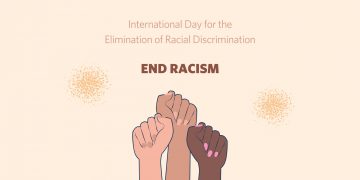How do we move Anti-racism efforts beyond a hashtag – #FIGHTracism?

Written by Catalina Parra
Since 1979, the International Day for the Elimination of Racial Discrimination (IDERD) is observed on March 21st. It marks the horrific day in 1960 when police in Sharpeville South Africa opened fire and killed 69 people who were peacefully demonstrating against apartheid “pass laws”. The Pass Laws Act of 1952 required black South Africans over the age of 16 to carry a pass book, known as a dompas, everywhere and at all times. The dompas was similar to a passport, but it contained more pages filled with more extensive information than a normal passport. Within the pages of an individual’s dompas was their fingerprints, photograph, personal details of employment, permission from the government to be in a particular part of the country. The dompas allowed to maintain control over the movement of black, Indian and colored people in South Africa.
The 2022 International Day focuses on the theme Voices For Action Against Racism and aims, in particular, to highlight the importance of strengthening meaningful and safe public participation and representation in all areas of decision-making to prevent and combat racial discrimination. This is a call for people everywhere to strengthen and consolidate their voices against racism, to mobilize against all forms and manifestations of racial discrimination and injustice, and to ensure a safe environment for those who speak up.
Today, it is both fair and timely to ask – Are we making progress in combatting racism? And what more do we need to do to continue the fight against racism? Across the world we see positive and relevant shifts in disrupting systems that segregated marginalized and oppressed peoples. For example, the system of apartheid in South Africa has been dismantled. Currently, action is being taken across the Canadian federal government to help make a difference in the lives of Canadians by addressing systemic barriers and particular challenges that result from racism. For instance, the commitment to the Truth and Reconciliation Commission Calls to Action, the public service action plan for wellness, diversity and inclusion amongst other initiatives (See Canada’s Anti-Racism strategy 2019-2022). However, too many people, groups, communities, and societies continue to be targets of racially-motivated violence and intimidation.
According to Statistics Canada (see report: Police reported hate crime in Canada, 2020), the number of police-reported hate crimes in Canada increased 37% during the first year of the pandemic, rising from 1,951 incidents in 2019 to 2,669 in 2020. Simultaneously, the Chinese population in Canada was 10 times more likely to report being a victim of ethnic or racial discrimination. Two surveys from The Chinese Canadian National Council’s Toronto chapter found more than 1000 self-reported incidents of anti-Asian racism since the start of the global COVID-19 pandemic. In the decade between 2007 – 2017, Indigenous people accounted for more than one-third of people shot to death by RCMP officers, despite representing 5% of the total population (see Reuters Toronto article). The rate of homicide for Indigenous peoples was almost seven times higher than for non-Indigenous people in 2020. In the same year, Prime Minister Justin Trudeau stated that, “Indigenous peoples, black Canadians and racialized Canadians are far more likely to suffer violence at the hands of the authorities and police than non-racialized Canadians […] There is systemic racism in Canada.” It is important to note that many incidents go unreported. Victims of crime may also be influenced by, among other things, language barriers, issues of trust or confidence in the police, or fear of additional victimization or stigma by the very act of reporting.
The Office of Respectful Environments, Equity, Diversity & Inclusion (REDI) Indigenous Initiatives Advisor, Derek Thompson urges us to assume our social responsibility to be an agent of change, to not be silent in the face of injustice and to reflect on our own biases and privileges. This process involves embarking on a journey of unlearning and re-learning new ways of interacting with others. We must continue to make every effort to change and commit by educating ourselves about the experience of populations targeted by oppression. It is time to be an upstander, speak up and intervene when something is wrong. REDI Executive Director, Roslyn Goldner, stated that “Universities are powerful agents of change and at UBC there is a genuine commitment to understanding and improving the experiences of all members of the community.” We also recognize that, “Universities are part of the cultural legacy of colonialism; they are part of the privileged dynamic that contributes to and sustains current inequities, and as members of the University community we have to accept that reality, and take responsibility and ownership.”
For more information on REDI training events and workshops visit: REDI – Events
If you require REDI trainings/workshops, please use the REDI- Services request form on our website